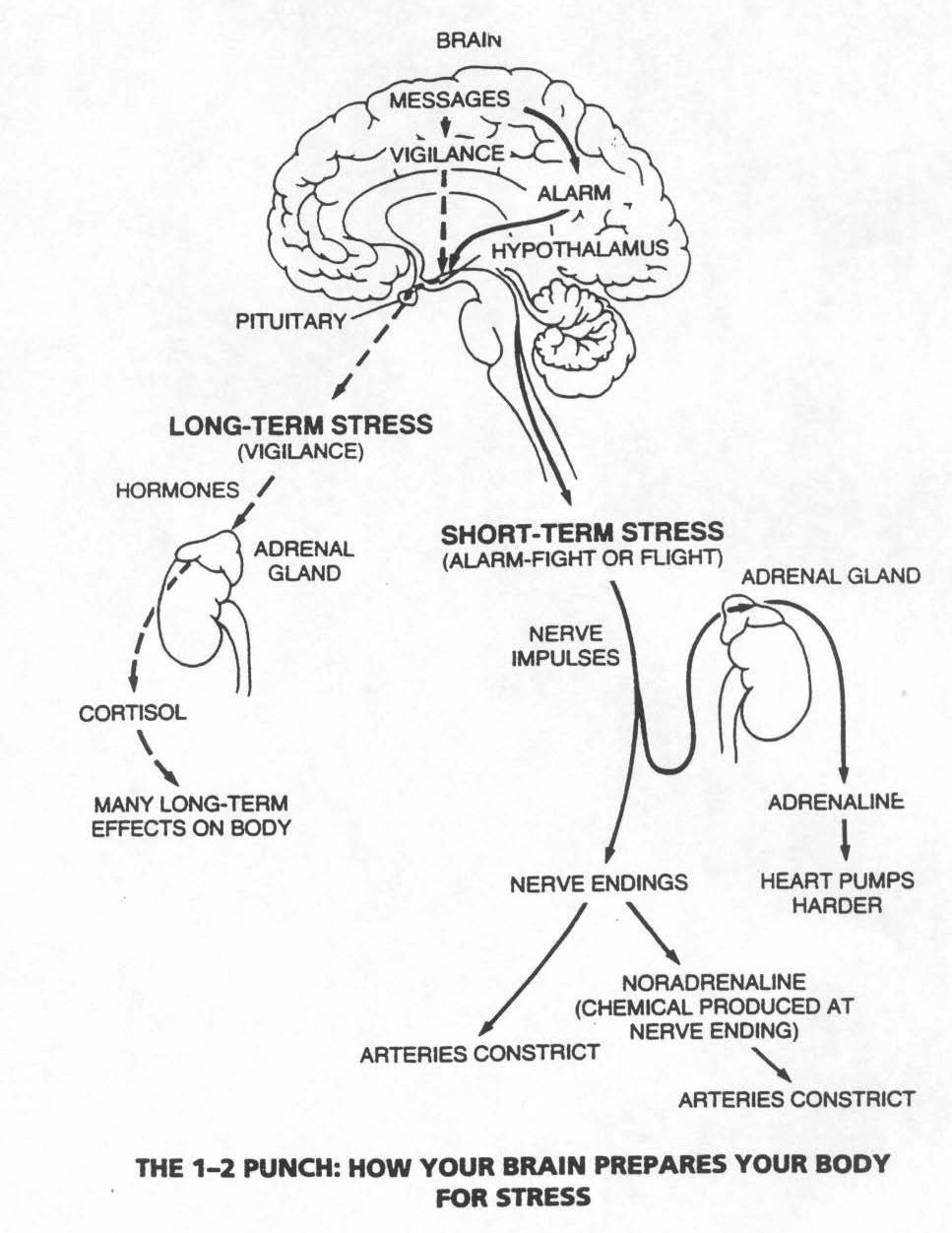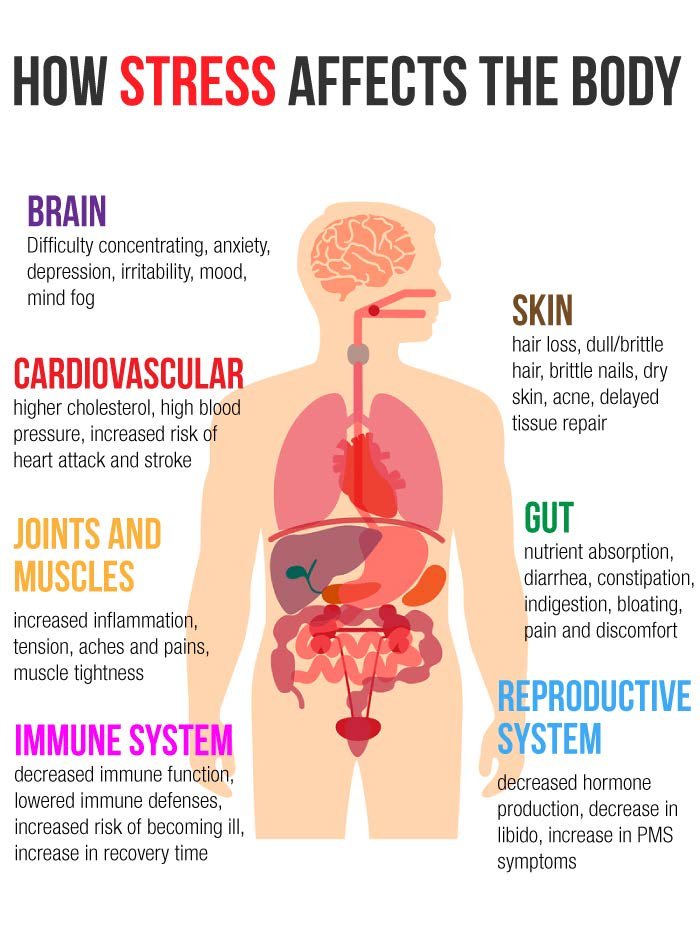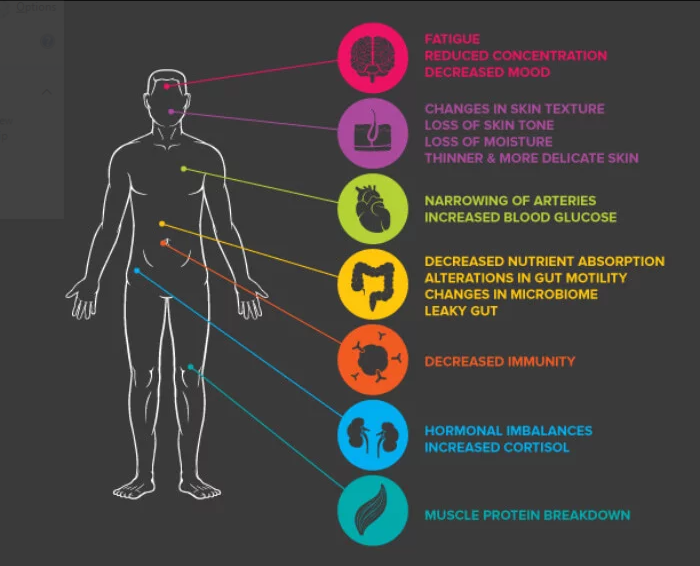The Effect of Stress On Your Body
When you sense danger, the hypothalamus at the base of your brain reacts. It sends nerve and hormone signals to your adrenal glands, which release hormones. These hormones are nature’s way of preparing you to face danger and increase your chances of survival.
One of these hormones is adrenaline. You might also know it as epinephrine, or the fight-or-flight hormone. In rapid fashion, adrenaline works to:
increase your heartbeat
increase your breathing rate
make it easier for your muscles to use glucose
contract blood vessels so blood is directed to the muscles
stimulate perspiration
inhibit insulin production
While this is helpful in the moment, frequent adrenaline surges can lead to:
damaged blood vessels
high blood pressure, or hypertension
higher risk of heart attack and stroke
Headaches
Anxiety
Insomnia
weight gain
Although adrenaline is important, it isn’t the primary stress hormone. That’s cortisol.
Stress and cortisol
As the main stress hormone, cortisol plays an essential role in stressful situations. The reason our body uses cortisol is
raising the amount of glucose in your bloodstream
helping the brain use glucose more effectively
raising the accessibility of substances that help with tissue repair
restraining functions that are nonessential in a life-threatening situation
altering immune system response
dampening the reproductive system and growth process
affecting parts of the brain that control fear, motivation, and mood
All this helps you deal more effectively with a high-stress situation. It’s a normal process and crucial to human survival. But if your cortisol levels stay high for too long, it has a negative impact on your health.
It can contribute to:
weight gain
high blood pressure
sleep problems
lack of energy
type 2 diabetes
osteoporosis
mental cloudiness (brain fog) and memory problems
a weakened immune system, leaving you more vulnerable to infections
it can also have a negative impact on your mood
Managing and Reducing Your Stress
The first action to take in managing your stress is acknowledging it is real. Many people don’t want to believe that they are stress as if doing so is some kind of weakness. I have a stress management and wellness planning template that I share with my clients so that they can priortise down time and create a tool kit to help them in stressful times. I’d be happy to share it with you too.
Stress is a natural part of everyday life and it’s not always a bad thing. The stress of deadlines can give us the motivation to work hard or innovate, the stress of being busy with projects at work allows us to gain experience, the stress of trying to run faster or further allows us to become fitter and stronger.
When stress becomes chronic then we need to create an action plan to manage it better. This allows us to avoid the negative side effects listed above, lower or cortisol levels and regain balance.
What relieves stress falls in to a few buckets I like to thing of these buckets as creativity, community, relaxation and rest.
Creativity is making something for the pure enjoyment of it, not to sell it or master it or because someone needs it. It is a key aspect of our emotional strength and sense of wellbeing. Creativity can be in he form of colouring, painting, garden design, baking, dance, potter, journaling, knitting, crochet, origami, woodwork, metal work, programming - basically anything, that makes something.
Community is spending time with your tribe, like minded people whose company relaxes you. This means can be so many things - it can be playing golf, being in a women’s circle, having friends over, doing a class, a community clean up, a men’s shed or a professional network. Anywhere were you feel at ease and able to be your authentic self.
Relaxation is something I often refer to as active rest, switching off your phone and being fully present, not sleeping or lying down but actual de-stressing. This can be a silent disco where you shake off your stress, a candle lit Epsom salt bath, a spa day, massage, meditation or Tai Chi class. Anywhere you can relax and switch off.
Rest is so needed for your body. Sleep, taking a break, going on holidays. Sleep and rest are two things that are under utilised in stressful periods.


